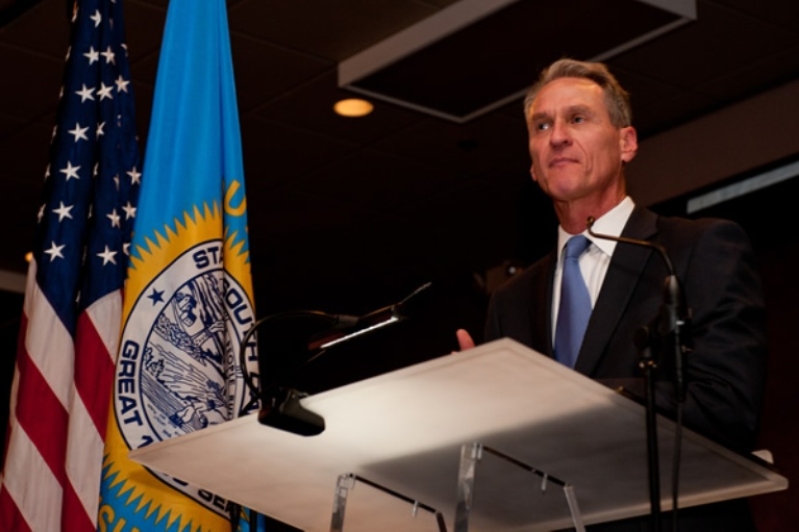
South Dakota Gov. Dennis Daugaard (R) signed a bill Friday that gives broad legal protections to faith-based, taxpayer-funded agencies whose representatives refuse to place adoptive children in certain households for reasons based on religious beliefs, especially relating to sexual orientation of child-seeking parents.
Daugaard said he's concerned private child-placement agencies, who he said they believed would be acting in the best interest of a child, could be subject to a lawsuit when denying placement to someone in a "protected class," such as members of the LGBTQ community. He wanted the new legislation to prevent such lawsuits, reports Fox News.
Jim Kinyon, executive director of South Dakota's Catholic Social Services, said the legislation attempts to ensure the state doesn't discriminate against faith-based organizations for their "sincerely held" beliefs.
Laura Durso, vice president of the LGBT research and communications at the Center for American Progress, said in a statement reported by Washington Blade that Daugaard signed legislation "shamefully targeting LGBT parents and vulnerable kids."
"SB 149 allows religiously-affiliated foster care and adoption agencies to turn away qualified LGBT parents and single moms who simply want to start families and give young people a safe, loving home," Durso said. "Same-sex couples are six times as likely to foster than different-sex couples are, and this bill proves once again that opponents of equality are happy to put children at risk and deny them permanent homes to further their anti-LGBT agenda."
In the past, Daugaard hasn't been vocal on the measure that supporters say pre-emptively protects religious adoption and foster care agencies from actions, such as state-funding cuts, revoked licenses, financial fines and denied contracts if South Dakota were to eventually ban discrimination based on sexual orientation as several other states have done.
"In the end, this bill was never about religious freedom. It has always been about allowing private organizations that discriminate to receive state contracts and taxpayer dollars to carry out their religions missions," said Libby Skarin, policy director of ACLU South Dakota. "We're particularly concerned about how this bill could impact vulnerable kids in our foster care system that deserve to have their best interests considered above the desires of private agencies."
She said the ACLU group is exploring legal challenges to the new law, and is encouraging children and adults who feel negative impacts to let them know.
Sponsor of this Senate Bill 149, Sen. Alan Solano, a Republican from Rapid City, said religious agencies in Massachusetts, Illinois, California and Washington, D.C., ended adoption services after states passed non-discrimination laws that include sexual orientation. He doesn't want the same thing to happen in South Dakota, though such a proposal hasn't attracted much support.
Human Rights Campaign Legal Director Sarah Warbelow said in a statement that Daugaard's action "signals the potential of a dark new reality for the fight for LGBTQ rights."
Critics think the bill could limit child-placement in South Dakota, and could invite costly federal litigation by cementing in state law the right to discriminate against same-sex couples, single parents and even households that observe a different religion.
Michigan, North Dakota and Virginia passed so-called religious exemption bills concerning adoption and foster care, which were the first since the 2015 U.S. Supreme Court ruling that legalized gay marriage.
Legislatures in Alabama, Texas and Oklahoma are considering similar "religious exemption" bills this year, reports Fox News.
South Dakota's law goes into effect in July 2017.







